Thecus N2310 Budget 2-bay NAS Review
by Ganesh T S on July 6, 2014 2:30 PM EST- Posted in
- NAS
- AppliedMicro
- Thecus
Multi-Client Performance - CIFS
Our multi-client evaluation involves accessing a CIFS share on the NAS from up to 25 virtual machines and simultaneously processing the same type of IOMeter workload on them. Our usual routine involves starting with 25 and moving down to 1 VM. Unfortunately, in the case of the N2310, IOMeter ended up hanging before the completion of the first workload. To make things easier to debug, we started the process with 1 VM and increased the concurrent accesses one by one. Around 4 VMs, we started seeing the hangs. Restarting the IOMeter processes helped get past the issue on a few occasions. However, beyond 9 concurrent VMs, we were never able to get the IOMeter workloads to run to completion. Either IOMeter would completely hang (as shown in the first screenshot below), or the maximum response time would become very high (the order of 90 seconds - half the workload duration) and increase the error count reported (second screenshot).
Multi-Client IOMeter Testing on the N2310 - Process Hang
Multi Client IOMeter Testing on the N2310 - Inordinate Response Times / Errors
In the rest of this section, we present data from the evaluation of up to 9 concurrent accesses to a CIFS share on the N2310. Other than the bandwidth and average response times, some of the interesting aspects from our IOMeter benchmarking run can be found here.
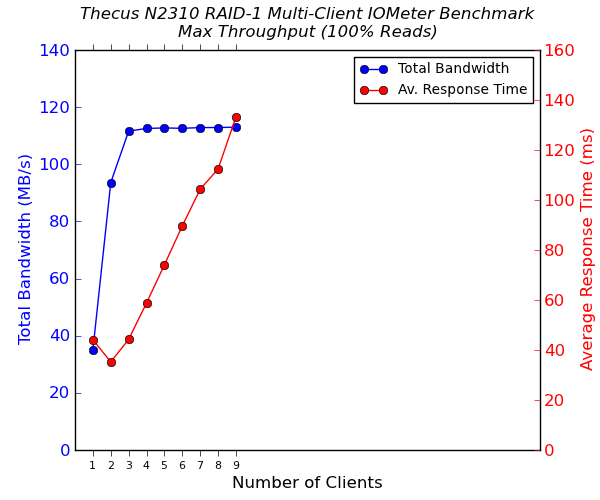
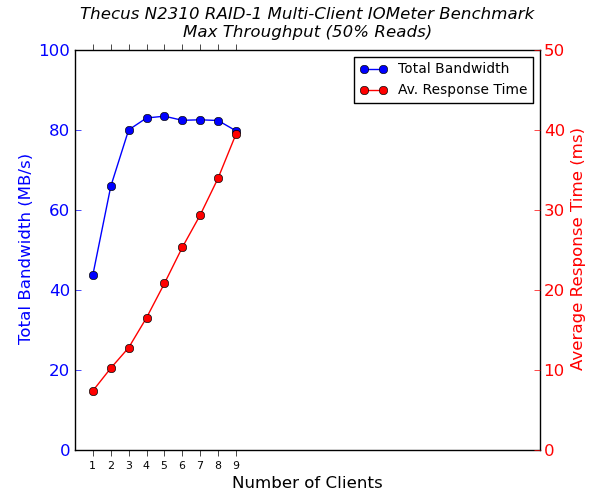
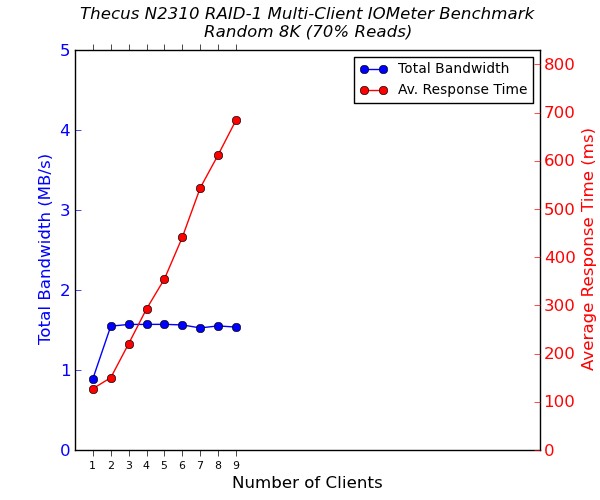
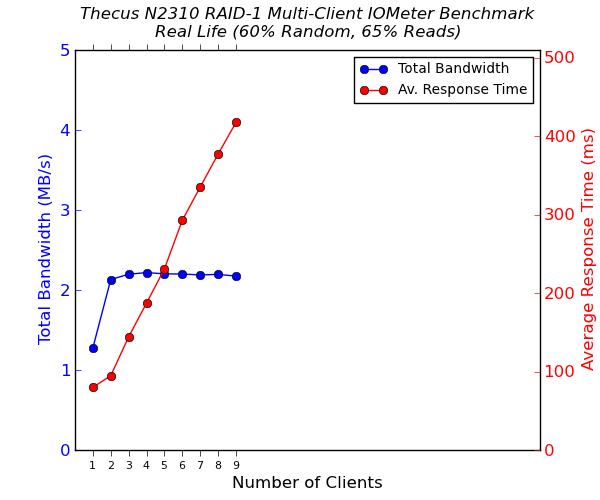
The above graphs show the limited results we were able to gather in our multi-client tests. The drop down boxes provide data from other 2-bay NAS units.


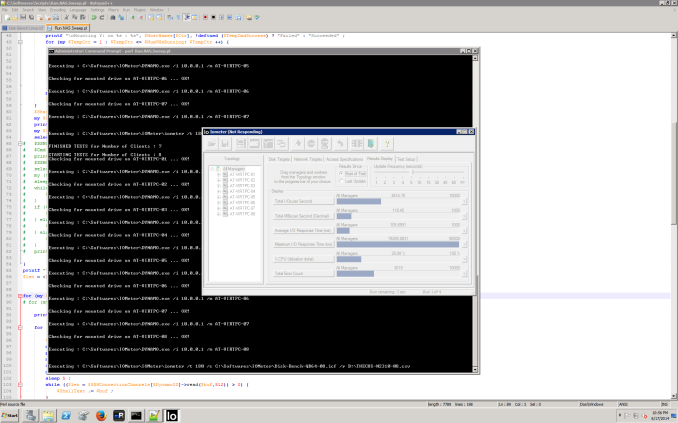
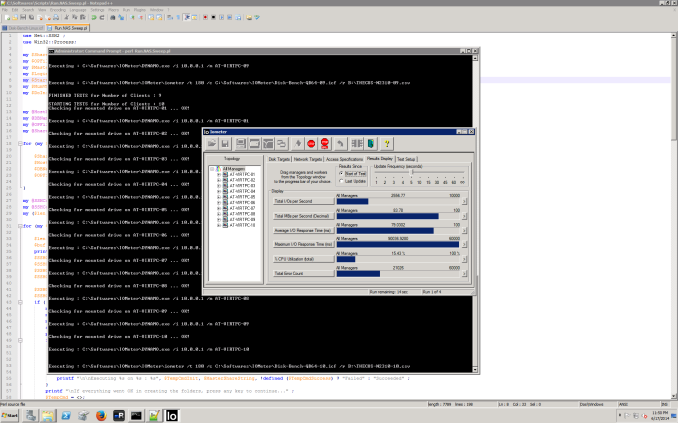








39 Comments
View All Comments
roman.md - Sunday, July 6, 2014 - link
imho, The average user will be happier with a 100$ cubietruck, with dual-core 1 Ghz ARM (vs single-core 800 Mhz PowerPC), 2 GB RAM (vs 512 MB).Impulses - Sunday, July 6, 2014 - link
Average user or average enthusiast? The latter - maybe, the former - not even.nvalhalla - Sunday, July 6, 2014 - link
cubietruck is a bare MB for $100. You still need a case. And it only has 1 SATA2 and USB 2.0. So there goes RAID.I'll take a dedicated device over a hacked together mess.
jabber - Sunday, July 6, 2014 - link
Meanwhile back in the real world...Some people (read most) just want something that works out of the box. I dont blame them in this instance.
DanNeely - Sunday, July 6, 2014 - link
thank you for making the obligatory "I could build something myself for less money and can't understand why anyone would want a prebuild NAS as a result" comment./sarcasm
Guspaz - Monday, July 7, 2014 - link
I did build my file server myself for less money than what was commercial available... but only because what was commercially available was enterprise-grade stuff that cost a small fortune.If there had been any prosumer-grade prebuilt appliance-type stuff that could have held 15 drives, I would have bought it instead of doing it myself. The problem is the only things that can do 15 drives are big, expensive, and very loud stuff meant to go in a datacenter. My home-built solution fits in a mid-tower ATX case, but building it was a huge pain, pain that I would have liked to avoid.
I understand perfectly well why somebody wants something that just works out of the box. Such a thing just doesn't exist for more than a handful of drives at once.
Samus - Monday, July 7, 2014 - link
cubie, seriously, has the worst IO performance of anything I've ever seen. I think the [single] SATA 2.0 connection is actually a bridged via USB, because I've never seen transfers over ~25MB/sec. You'd be just as bad off with a $35 RaPI as a NAS. The CPU and memory means very little if they are that IO limited.betam4x - Sunday, July 6, 2014 - link
I'm going to be honest here, you should stay FAR away from Thecus as a company. We made the dire mistake of buying a Windows based NAS from them. The NAS didn't come with a full version of Windows (despite practically all the resellers claiming it did). In addition, getting a copy of Windows Storage Server 2008 is impossible due to it being discontinued and they refuse to certify Storage Server 2012 for use with their products DESPITE the fact they still sell the NAS hardware itself. To top it all, the RAID is software only. It has a RAID card, but reads something like prototype or beta only (can't remember which), do not distribute. After contacting Thecus we were told that their windows storage solutions are meant for software RAID only. Our purchase led to a major retailer pulling the Windows based NAS completely from it's website due to our issues and offering us a considerably large gift card for the trouble.Samus - Monday, July 7, 2014 - link
I've had iffy luck with Thecus (honestly, I've not used one of their NAS) but by no means are they as bad as, say, Norco, Sans Digital, or as Ganesh stated, D-Link/Netgear/WD.Samus - Monday, July 7, 2014 - link
Even though this runs a standard linux kernel, Synology is hard to ignore in the consumer (and even SMB) NAS market simply because the OS is so flexible. I've set them up to run everything from remote access servers to MySQL (which can host a Quickbooks database, website CMS, etc.)Synology offers dozens of free apps for their OS, such as uTorrent, cloud replication\remote backup services, AirTunes server, XBMC portal, VPN, database hosting, even WINE emulation. Then there are the paid apps that bring in the big dogs like mail services (hosting, ie Exchange, SPAM filtering, domain management,) RAS, and recently, virtualization. The hardware isn't really powerful enough to do this stuff on a corporate scale, but the point is it can be done for light loads, making the death of the small business server even more obvious in the near-term as these network appliances offer nearly all the services servers do.